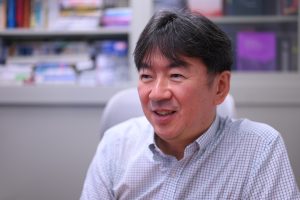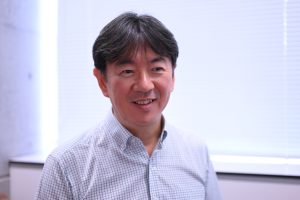
川西 哲也
(カワニシ テツヤ)
教授/博士(工学)
電子物理システム学科では、幅広いカリキュラムと先端研究をとおして基礎学理と応用力を兼ね備えた人材育成を目指しています。物理学の基礎をしっかり学んだ上で、基礎物性分野、エレクトロニクス分野、フォトニクス分野、情報システム分野の基幹技術を学びます。化学やバイオなどとの融合により最先端の研究も進めています。
電子物理システム学科は、電子と光を活用するための技術や学問を、物理を基礎として理解し、さらに新しい学術へ発展させることを目指しています。2年次の学科配属後、数学、物理、化学の基礎科目をベースに、量子力学、固体物性などのナノ・マイクロ領域科目から、電磁気学、回路理論、情報工学などの電子工学の中心科目、光エレクトロニクス(フォトニクス)や光通信システムなどの光関連科目、そして電子デバイス、高密度集積回路、システムLSI設計などの電子システム領域科目を勉強します。少人数教育により、基礎から分かりやすく、かつ年次進行により無理なく高度な学問を学習することが可能です。
皆さんは20年後、30年後に重要となる技術は何であるか正確に予測できますか?残念ながら私自身はできません。皆さんが、希望通りの職に就くことができたとしても、そこで必要となる知識やスキルが数十年にわたって変化せずに安定した状況が続く可能性は低いと言わざるを得ません。何度か大きな変革を経験されるでしょう。その中で、物理にもとづく基礎学理は不変であり、基礎力と応用力を兼ね備えた人材こそが、大きなイノベーションを起こすことができると考えています。電子物理システム学科では、物理、エレクトロニクスなどの基礎学理をしっかりと身につけ、これらの知識を応用して現実の問題を解決する能力をもち、次世代の技術革新を牽引する人材の育成を目指しています。学際的なカリキュラムを通じて、エレクトロニクス、フォトニクス、情報システム、材料科学、物理学などの幅広い分野を統合して学ぶ機会を提供し、理論と実践の両方に重点を置いた教育を行っています。
光と電波を組み合わせたシステムについての研究をしています。光も電波も電磁波の仲間ですので基礎となる理論は共通ですが、その性質は大きく異なります。共通に考えてよいところと違いを意識する必要がある部分をしっかりと理解し、それぞれの特徴を生かした応用が大切です。最近は、光と電波の境界に位置する電磁波であるテラヘルツ波に関する研究を進めています。普段使っている無線LANや携帯電話の電波と比べると波長が100分の一程度、周波数でいうと100倍程度になります。国内外の研究機関との共同研究で周波数300GHzのテラヘルツ波を使った無線通信の研究をしています。屋外設置可能なテラヘルツ波通信装置を開発しました。61号館の屋上で通信状況を24時間測定することが可能です。テラヘルツ波はまっすぐ進む性質が強いのでアンテナの向きを調整するのが難しいのですが、この装置は自動調整機能を備えています。この装置は気象センサーも備えていて、様々な状況でのテラヘルツ波通信の特性を測定することができます。このような装置は世界でも早稲田にしかなく、貴重なデータが得られます。
社会に役に立つための応用についても外部の研究機関や企業との連携で進めています。例えば、空港の滑走路のボルトなどの異物を監視するためのレーダーや高速鉄道向けの通信システムの研究開発があげられます。これらは光と電波をうまく組み合わせたシステムで、不要な電波の放射を抑えつつ、必要な性能を確保することを目的としています。海外との共同研究も積極的に実施しています。大学院の学生がクアラルンプール国際空港での実験に参加したこともあります。光や電波の基礎的な性質についても研究をしています。光から電気を互いに変換する高速デバイスの開発や、光や電波の伝わり方の変動についての研究は学術的にも意味がありますし、安定した通信を確保するためにも重要です。

今話題となっている分野に興味をもつことは価値のあることですが、少子化や環境問題などの困難な社会問題の解決には大きなイノベーションが必要で、まだ私たちが気づいていない技術が主役になるかもしれません。今すぐ役に立つための応用とまだ見ぬ将来の技術に備えた基礎学問の両方を追うことを是非目指してください。物理を理解した上で情報システム、エレクトロニクス、フォトニクスや材料工学を学びたいという方には最適な学科だと思います。プログラミングや数学もツールとしては使いますので、これらが得意な人も大歓迎です。